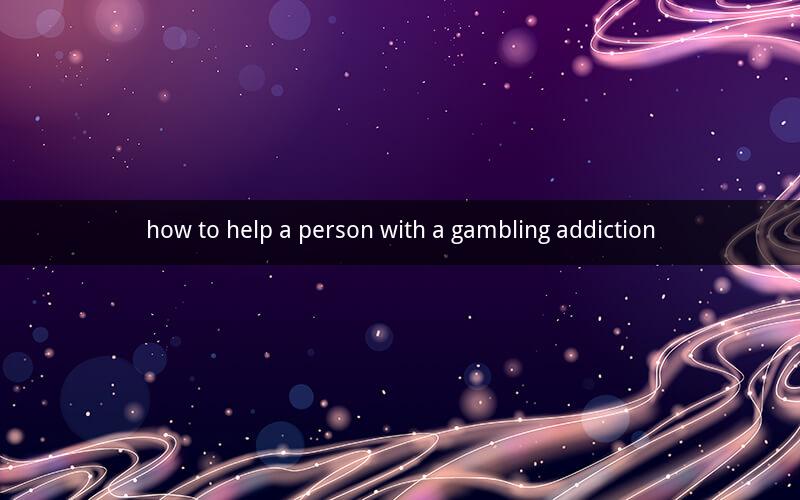
Contents
1. Understanding the Problem
2. Recognizing the Signs of a Gambling Addiction
3. Encouraging Communication
4. Offering Support and Understanding
5. Seeking Professional Help
6. Understanding the Role of Family and Friends
7. Setting Boundaries and Expectations
8. Creating a Supportive Environment
9. Promoting Healthy Coping Mechanisms
10. Monitoring Progress and Providing Encouragement
1. Understanding the Problem
Gambling addiction, often referred to as gambling disorder, is a serious condition characterized by an inability to control or stop gambling despite negative consequences. To help a person with a gambling addiction, it's essential to first understand the nature of the problem and the challenges they face.
2. Recognizing the Signs of a Gambling Addiction
Identifying the signs of a gambling addiction is crucial in providing the right kind of assistance. These signs include hiding gambling activities, borrowing money, lying about gambling habits, neglecting responsibilities, and experiencing financial, social, and psychological distress.
3. Encouraging Communication
Open and honest communication is key to helping someone with a gambling addiction. Encourage them to express their feelings and concerns without fear of judgment or punishment. Active listening can provide a safe space for them to share their struggles.
4. Offering Support and Understanding
Show empathy and support without enabling their behavior. Understand that recovery is a long and challenging journey, and they may face setbacks. Your unwavering support can be a powerful motivator.
5. Seeking Professional Help
Professional help is often necessary for effective treatment. Encourage the person to seek therapy, counseling, or support groups. A therapist can provide tailored strategies for managing the addiction and dealing with underlying issues.
6. Understanding the Role of Family and Friends
Family and friends play a vital role in the recovery process. Educate yourself on the addiction and its impact. Offer your support, but also set boundaries to protect your own mental and emotional well-being.
7. Setting Boundaries and Expectations
Establish clear boundaries and expectations to help the person stay accountable. This might include limiting access to money, monitoring their online activities, or helping them find alternative hobbies.
8. Creating a Supportive Environment
A supportive environment can significantly aid in recovery. Encourage activities that do not involve gambling and foster a sense of community and belonging.
9. Promoting Healthy Coping Mechanisms
Teach the person healthier ways to cope with stress, anxiety, and boredom. Activities such as exercise, meditation, and creative outlets can be beneficial.
10. Monitoring Progress and Providing Encouragement
Regularly check in on the person's progress. Offer encouragement and celebrate milestones, no matter how small. Recovery is a process, and progress may be slow.
---
10 Questions and Answers
Question 1: How can I help a friend who has a gambling addiction without enabling their behavior?
Answer 1: Encourage them to seek professional help and offer to go with them to appointments. Set boundaries by limiting their access to money and providing healthy alternatives to gambling.
Question 2: What should I do if my family member's gambling addiction is causing financial strain?
Answer 2: Offer to help them create a budget and manage their finances. If necessary, seek the assistance of a financial advisor to help them regain control over their finances.
Question 3: How can I support someone who has recently stopped gambling?
Answer 3: Continue to be a source of emotional support. Encourage them to participate in support groups and offer to attend meetings with them.
Question 4: Is it possible to help someone with a gambling addiction if they refuse to seek help?
Answer 4: While you cannot force someone to seek help, you can continue to show support and be a positive influence. Eventually, they may recognize the need for assistance.
Question 5: How can I help my loved one rebuild their life after a gambling addiction?
Answer 5: Help them find new interests and hobbies, connect with supportive communities, and provide resources for job training or education.
Question 6: What are some common triggers for a gambling addiction?
Answer 6: Triggers can include financial stress, emotional distress, boredom, and social situations. Understanding these triggers can help in creating a supportive environment.
Question 7: Can a gambling addiction be cured?
Answer 7: While there is no guaranteed cure, recovery from a gambling addiction is possible with the right support, treatment, and coping strategies.
Question 8: How can I tell if someone's gambling has become an addiction?
Answer 8: Look for signs such as secrecy, borrowing money, lying, neglecting responsibilities, and experiencing negative consequences due to gambling.
Question 9: What resources are available for someone struggling with a gambling addiction?
Answer 9: There are numerous resources available, including counseling services, support groups, hotlines, and online communities. Research local and national organizations that specialize in gambling addiction.
Question 10: How can I stay motivated to support a loved one through their recovery journey?
Answer 10: Remind yourself of the positive impact your support can have. Celebrate small victories and milestones, and take care of yourself so you can continue to be a reliable source of encouragement.